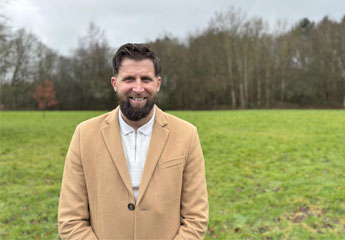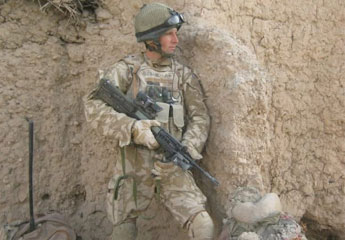
How Combat Stress helps veterans with their mental health
When Gary ‘Gaz’ Kennedy was medically discharged from the British Army with Post-Traumatic Stress Disorder (PTSD) his life began to unravel. He felt constantly on edge and began using alcohol as a way to suppress his feelings and help him sleep. His relationship with his wife broke down and she moved away, taking their son with her.

He added, “I learned to put on a mask and pretend I was an outgoing person who was happy. But I was getting worse every day. I went days without sleep because I had a fear of going to bed and suffering nightmares and night sweats. I couldn’t walk down the street without looking over my shoulder. I was on high alert all the time.”
Ultimately, it was veterans’ mental health charity Combat Stress that helped transform Gaz’s life. A combination of one-to-one counselling, peer group therapy and occupational therapy gave him the tools he needed to control his PTSD. He said, “If I want to do something now, I’ve got the ability to do it. I still get a bit of anxiety, but I can control my thoughts and feelings.”
Raised in Barrow-in-Furness, Gaz saw the army as a means of escaping his hometown and seeing the world. He left school in July and joined the military in September. He was only 20 when he deployed to Iraq.
Travelling to Afghanistan in 2009 with the Coldstream Guards, he found himself on the frontline of a radically different conflict. He said, “There wasn’t a day in the seven months I was there that I didn’t fire my rifle or get shot at. As soon as we left our base, we were basically in Taliban territory.”
One incident was more harrowing than most. Caught in an exposed position on the roof of a building in Babaji and taking fire from multiple enemy combatants, he thought his luck had run out. He said, “I could see where the bullets were hitting, and I was returning fire and just hoping to survive.”
Another member of his regiment caught on the same roof was almost killed when a bullet slammed into his helmet just millimeters from his face.

On the night of his birthday he came home, lined up all of his tablets and washed them down with a glass of wine. He remembers thinking, “I want an escape from this so much I don’t care if I wake up tomorrow.”
He was found by a friend, another ex-serviceman, the following day. The friend called Combat Stress and his long path to recovery began. He said, “They [Combat Stress] went above and beyond for me. I thought I couldn’t be fixed, but they organised one-on-one treatment with a therapist who started to break down the barriers in a controlled way. We slowly built a rapport that allowed me to feel comfortable.”
After that, Combat Stress put Gaz on a one-week course with a group of fellow veterans. They talked about PTSD, how it affects people and why some people get some of the symptoms, but not others.
Combat Stress subsequently placed Gaz on a 3-week residential course at its facility in Leatherhead where he had treatment every day.
Nowadays, he lives in Basingstoke with his partner and their dog. He works as a project manager and says his life has “gone in a different and better direction”. He added, “I cannot thank Combat Stress enough for what they’ve done and the way they’ve turned my life around.”
Combat Stress has received National Lottery funding to help provide its life-changing mental health treatment to more veterans like Gaz.
Gaz has written a book about his experiences called The Silent War. It is available on Amazon and 100 percent of the proceeds go to Combat Stress.
20th October 2025
The National Lottery has been changing the lives of winners and supporting good causes across the UK since 1994. In that time, there have been more than 7,700 new millionaires created and, by playing The National Lottery, you raise around £32 million for Good Causes, on average, every week.Δ
Discover more
